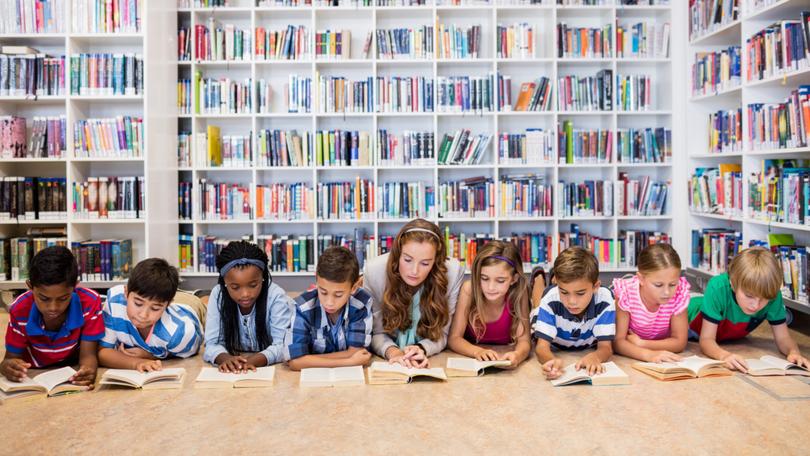US expert Emily Hanford reveals how teaching kids to read went so wrong
Emily Hanford was hearing the same story from many parents — their children weren’t learning to read. Her investigation overturned decades-old practices

Teaching kids how to read is just too important to leave to chance — or to outdated methods that are not grounded in evidence.
That is the key message from Emily Hanford, the US reporter behind the incredibly influential podcast Sold a Story: How Teaching Kids to Read Went So Wrong, who is visiting Australia for the first time.
The investigative podcast focused on how teaching methods disproved by cognitive scientists decades ago were still being pushed into thousands of schools, harming generations of children and wasting taxpayers’ money.
Sign up to The Nightly's newsletters.
Get the first look at the digital newspaper, curated daily stories and breaking headlines delivered to your inbox.
By continuing you agree to our Terms and Privacy Policy.“I think this is just an important thing that people should know about,” Hanford said.
“I think the implications are very large for our society in general. And so I wanted to make people care about this.”
But even she has been slightly surprised by the impact of the award-winning podcast. Since it was first released in 2022, at least 15 US States have passed laws to change the way reading is taught in schools.
Closer to home, New Zealand made the decision just three weeks ago to ditch Reading Recovery, a program devised in the 1960s by New Zealand educator Marie Clay, whose reliance on a flawed theory of how kids read underpinned programs around the world.
Visiting Australia for a series of events “the why, the what and the how of evidence-based reading instruction”, Hanford said she would be telling a story that was very American focused.
“But I understand, through interviews I’ve done with people in Australia and New Zealand, things I’ve read, stuff I’ve seen on social media, that the stories are remarkably similar between the United States and Australia and New Zealand and other parts of the world, too,” she said. “But I think especially these three countries plus Canada, we have very similar stories.”

As an education reporter and producer for American Public Media, Hanford’s interest was sparked when she realised she was hearing the same story from many parents — that their children weren’t learning to read even though they came from affluent homes with lots of books and language.
That was when she began to delve into the science of reading — a term that has increasingly gained traction in Australia — referring to thebody of research on how kids learn to read.
Through talking to teachers, she realised many had not been taught about the science of reading, either at university or on the job.
And much of what they had been taught was at odds with what the research said.
In particular, the discredited 50-year-old reading strategy known as “multi-cueing” or “three-cueing”, where children are taught to guess unknown words based on clues such as pictures on the page.
Research has found multi-cueing is an ineffective strategy compared with teaching children to “decode” words by connecting sounds with letters using phonics.
While most Australian States have moved away from Reading Recovery, many schools use elements.
Hanford said she hoped educators in Australia would be open to learning more about the research.
“One of the things about Reading Recovery was the intent was completely in the right place,” she said.
“(But) some of that stuff is just out of date in terms of some of the more recent research.”
Even though it had been difficult as a reporter to explain concepts that seemed subtle, such as multi-cueing, she came to realise the huge implications.
To become good readers, she said, kids needed to learn to sound out the words — not look at pictures for clues.
“You don’t want your eyes to dart all around and look at pictures and look at other words and look up to your teacher for help,” she said.
“You want the kid to really be looking at the word and learning how to sound it out, and understand the relationships between the letters and the sounds.”
Hanford said children “need and deserve good instruction” in how written language works.
“We shouldn’t be leaving it to chance or expecting kids to discover a decent amount of it on their own,” she said. “We need to embrace how important it is to have a structured approach to make sure that kids gain those skills that are so fundamental and foundational — and really just cause so many problems for kids if they don’t get those early.”

Edith Cowan University reading expert Lorraine Hammond, who will also speak at the events in Melbourne, Sydney and Perth, says Hanford has had a “significant impact” on evidence-based reading instruction.
“It had to come from an outsider, someone who could show teachers why there was a need for a change,” she said.
“With over three million downloads of the podcast, she’s better known than some reading researchers.”
Australia has had similar battles over reading, with a recent report from Melbourne think tank the Grattan Institute claiming that one-third of Australian children are unable to read proficiently because of poor teaching methods.
Lead author Jordana Hunter argued a key cause of the problem — which she estimated cost the economy $40 billion — was decades of disagreement about how to teach reading.
“Australia is failing these children,” she said when the report was released in February. “And it’s a preventable tragedy — the reason most of these students can’t read well enough is that we aren’t teaching them well enough.”
Dr Hunter, who was also a member of an expert panel which recently reported to the Federal Government on how to improve Australia’s education system, said the evidence was clear that all schools should use the “structured literacy” approach to teach reading.
La Trobe University’s Pamela Snow will also join the lectures, which begin Saturday.
We shouldn’t be leaving it to chance or expecting kids to discover a decent amount of it on their own.
